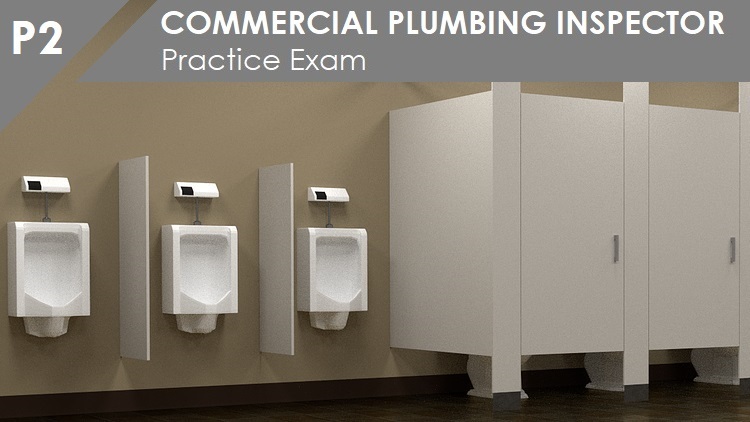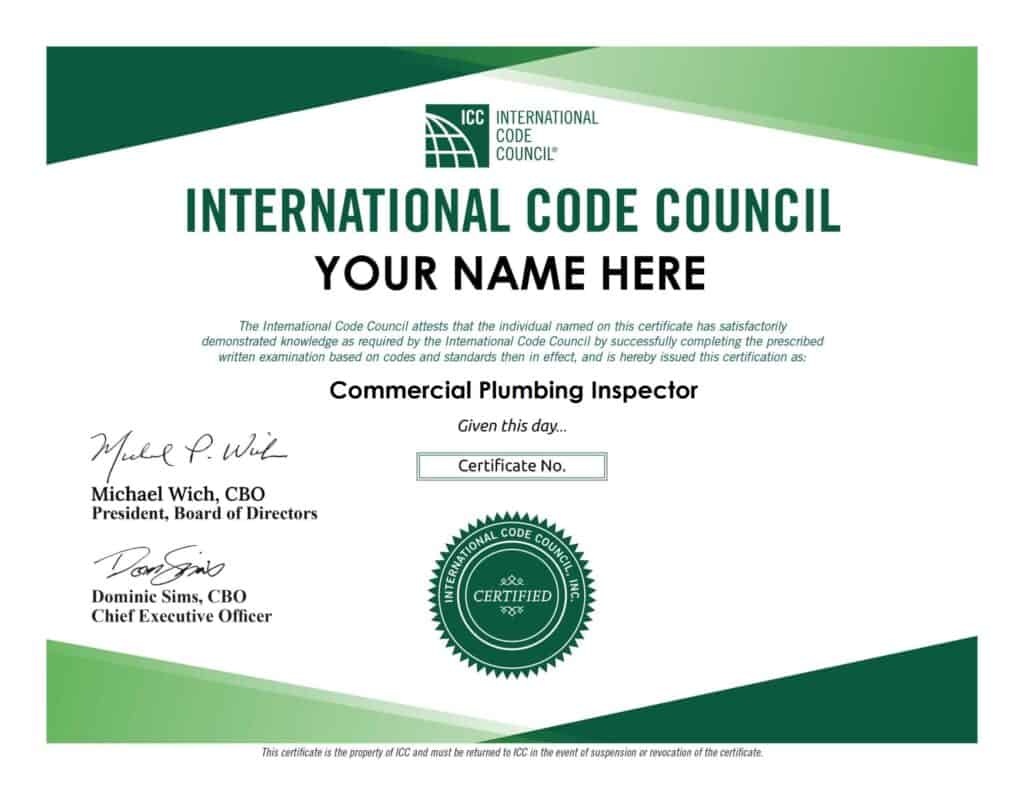
Includes 2 Practice Exams
60 Questions Each
Want to become a Certified Commercial Plumbing Inspector?
The P2 Commercial Plumbing Inspector Certification Exam administered by the International Code Council (ICC) tests an individuals knowledge of the International Plumbing Code® (IRC®), International Fuel Gas Code® (IFGC®), and ICC A117.1 Accessibility Standard.
Your first step is to know a little bit about the exam itself and what areas you should be studying for.
As a Certified Commercial Plumbing Inspector you are responsible in verifying the design, installation and inspections for all commercially installed plumbing systems complete with their fixtures, equipment, appurtenances, and appliances.
The commercial plumbing inspector is also responsible in verifying the installation, design, and inspections for all storm water systems, special waste systems, and all non-flammable medical and nonmedical oxygen piping systems and compliance with the International Plumbing Code and its standards.
The Commercial Plumbing Inspector is capable of locating specific sections within the code books referenced above in order to interpret regulations and provide accurate information to applicants, contractors, property owners, and colleagues.
P2 Commercial Plumbing Inspector Exam Specifications
The exam consists of 60 multiple-choice questions. You have a time limit of 2.5 hours to complete the exam and it is open book meaning you can only use the code books referenced by ICC. For this exam it is the International Plumbing Code® (IRC®), International Fuel Gas Code® (IFGC®), and ICC A117.1 Accessibility Standard.
The code edition of the references used should reflect the code edition of the exam you are taking. For example if you plan to take the 2021 version of the exam, you should use the 2021 International Plumbing Code. No work experience is required to take the exam and you must be at least 18 years of age.
The International Code Council (ICC) requires you to take the exam through the PRONTO system.
PRONTO is a new way of taking your testing exam from the comfort of your home or office. PRONTO stands for Proctored Remote Online Testing Option. For more information about the PRONTO online testing option, click here.
What does the P2 Commercial Plumbing Inspector exam cover?
This exam covers 9 main areas such as:
- General Requirements
- Fixtures
- Water Heaters
- Water Supply and Distribution
- Sanitary Drainage
- Vents
- Traps, Interceptors, Separators, Special Piping, and Storage Systems
- Storm Drainage
- Health Care Plumbing
The following exam content outline can act as a study guide to help you study for the exam and to gain a better understanding of what the 9 main areas of the exam will cover.
General Requirements | 8% |
Piping Protections Inspect all piping systems to insure protection as required from corrosion, stress and strain, freezing, and physical damage. | 5% |
Piping Installation, Support, Sleeving, and Penetrations Inspect all piping systems for proper installation, support, sleeving, penetrations (fire, structural, etc.), and waterproofing of exterior openings. Verify that all required tests of installed piping systems are conducted. | 3% |
Fixtures | 15% |
Fixtures and Material Approvals Inspect for approved materials and fixture approvals. | 2% |
Installation, Location, Clearance, and Access Inspect for proper installation of fixtures including accessibility, waste receptors, appliances, and appurtenances, including clearances, access, and sealing. | 5% |
Flow Rates Inspect for maximum and minimum flow rates and temperature control valves. Inspect for proper installation of faucets, fixture fittings, and accessories. | 3% |
Accessibility Inspect for installation of accessible fixtures, including clearance, height, spacing and arrangements. | 5% |
Water Heaters | 12% |
Installation Requirements Inspect for proper use and installation of materials, listing, and labeling, including clearances, locations, protection, pans, and seismic restraint, and check for appliance approval. Inspect for required valving, T&P valve and discharge piping installation, and thermal expansion requirements. | 5% |
Gas Piping, Combustion Air, and Venting Inspect for proper sizing of fuel gas piping, combustion air requirements, and required venting. | 7% |
Water Supply and Distribution | 18% |
Materials, Joints, and Connections Inspect for approved materials, joints, and connections. | 3% |
Identification, Sizing, and Valving Inspect the service and distribution piping for proper installation of cold and hot water delivery including minimum and maximum pressure and volume requirements, identification, sizing, valving, insulation and safety. | 5% |
Protection Against Contamination and Treatment | 5% |
Nonpotable Water Distribution Systems | 5% |
Sanitary Drainage | 13% |
Materials and Fittings Inspect for approved materials and use of proper fittings, joints, and connections. | 3% |
Sizing of System | 4% |
Valves, Sumps, Ejectors, and Cleanouts | 3% |
Indirect Waste | 3% |
Vents | 15% |
Materials, Joints, Connections, and Grades Inspect for approved materials, joints, connections, and proper grades. | 5% |
Sizing, Method, and Installation Inspect for proper sizing and the minimum venting requirements, methods, and installation. | 10% |
Traps, Interceptors, Separators, Special Piping, and Storage Systems | 9% |
Installation Requirements | 5% |
Chemical Treatment, High Temperature, and Neutralization Systems | 4% |
Storm Drainage | 5% |
Materials Sizing and Installation | 3% |
Sub-soil Sub-drains | 2% |
Health Care Plumbing | 5% |
Materials and Installation | 2% |
Service and Distribution | 3% |
What do you get when you pass the P2 Commercial Plumbing Inspector exam?
Certification
Bragging rights! Well actually you will receive a pass letter the same day right after your exam. You will have a certification number assigned to you so that if someone were to search for a certified professional within the ICC website, your name will come up!
In addition to being a Certified Commercial Plumbing Inspector (Yayyy!) you will receive a wall certification that looks like this…

Need Practice?
Why not try our P2 Commercial Plumbing Inspector Practice Exam?
Want to test your knowledge of how well you know the code? Or maybe just get a feel for the exam?
Try out our Practice Exam for the P2 Commercial Plumbing Inspector Certification Exam!
This practice exam is designed for those who are looking to take the 2021 or 2018 version of the P2 Commercial Plumbing Inspector Certification Exam through the International Code Council (ICC). These practice exams are intended to help you prepare for the actual exam by helping you navigate through the code book to familiarize yourself with the specific code sections. They will test your knowledge on the exam content areas covered to improve your chances of passing the certification exam.
This is a great way to prepare yourself for the actual exam administered by ICC. Every building code professional knows that the key to passing the ICC exams is to do practice problems. Don’t just take the exam purely on experience alone. Let this resource get you focused on realistic problems built around the exam content being covered.

Includes 2 Practice Exams
60 Questions Each
Happy Test Taking!
Related Articles to Read:
